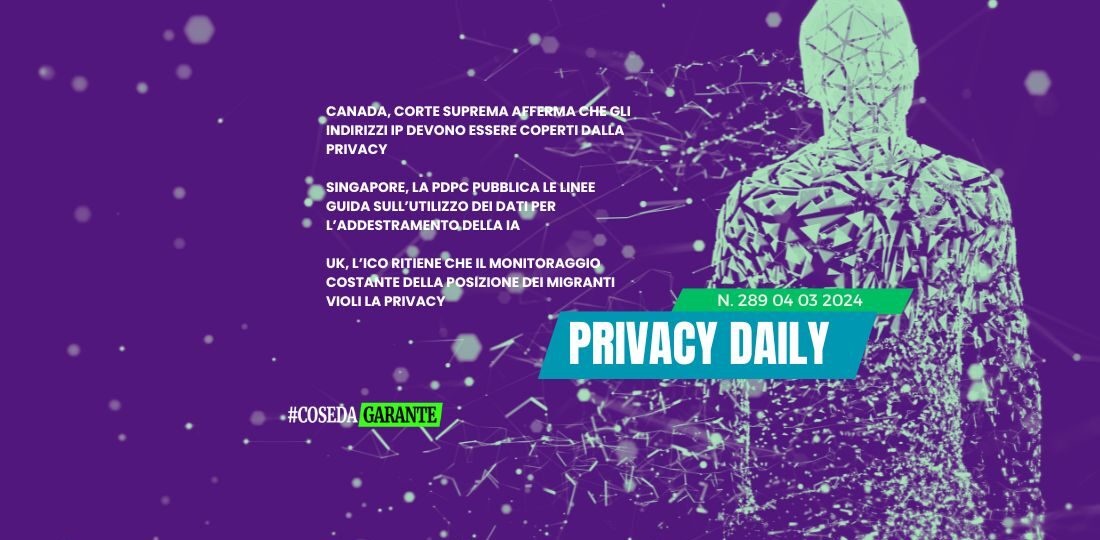VERSIONE ITALIANA
CANADA, CORTE SUPREMA AFFERMA CHE GLI INDIRIZZI IP DEVONO ESSERE COPERTI DALLA PRIVACY
In Canada la Corte Suprema ha stabilito che la polizia per accedere all’indirizzo Ip di un computer deve ottenere un’autorizzazione giudiziaria, poiché questo costituisce un collegamento diretto tra la persona che lo adopera persona e la sua attività online. La sentenza è stata emessa in seguito a un caso nel quale la polizia di Calgary ha indagato su transazioni online fraudolente. La polizia ha ottenuto nomi e gli indirizzi dei clienti coinvolti, utilizzando gli indirizzi IP forniti da un fornitore di servizi di pagamento. I questo caso la Corte Suprema ha sostenuto che un indirizzo IP è la chiave per capire l’attività di un utente online e che può rivelare informazioni personali pertanto deve essere protetto come parte della privacy online..
https://centralalbertaonline.com/articles/supreme-court-of-canada-says-a-computers-ip-address-deserves-privacy-protection
SINGAPORE, LA PDPC PUBBLICA LE LINEE GUIDA SULL’UTILIZZO DEI DATI PER L’ADDESTRAMENTO DELLA IA
Il Personal Data Protection Act è la legge che a Singapore stabilisce gli standard di protezione dei dati personali. Questa legge richiede alle organizzazioni di seguire una serie di requisiti che disciplinano la raccolta, l’uso, la divulgazione e la conservazione dei dati personali ed istituisce anche un registro nazionale Do Not Call (DNC) che consente di evitare di ricevere chiamate indesiderate a scopo di telemarketing. La Commissione per la protezione dei dati personali di Singapore ha pubblicato a corredo delle linee guida sull’uso dei dati personali nei sistemi decisionali automatizzati basati sull’intelligenza artificiale. Queste linee guida fanno chiarezza sull’utilizzo dei dati personali utilizzati per addestrare i sistemi di intelligenza artificiale, sul consenso dei consumatori, sull’informazione per gli sviluppatori di terze parti e sulle pratiche per conformarsi alla legge sulla protezione dei dati personali. Il PDPA riconosce la necessità di proteggere i dati personali degli individui, ma anche la necessità delle organizzazioni di utilizzare questi dati per scopi legittimi.
https://iapp.org/news/a/singapores-pdpc-issues-use-guidelines-for-automated-decision-making-systems-powered-by-ai/
L’ICO RITIENE CHE IL MONITORAGGIO COSTANTE DELLA POSIZIONE DEI MIGRANTI VIOLI LA PRIVACY
L’ICO -Information Commissioner’s Office – ha notificato al Ministero dell’Interno del Regno Unito che a suo avviso non ha valutato adeguatamente i rischi per la privacy derivanti dal monitoraggio elettronico delle persone arrivate nel paese tramite mezzi non autorizzati. Il progetto pilota, discusso tra ICO e la Home Office a partire da agosto 2022, prevedeva l’utilizzo di cavigliere e il tracciamento GPS di un massimo di 600 migranti in libertà provvisoria. Obiettivo del progetto pilota era quello di valutare se il monitoraggio elettronico fosse efficace per mantenere un contatto regolare con i richiedenti asilo e ridurre il rischio di fuga. John Edwards, Commissario per l’Informazione del Regno Unito, ha sottolineato che il progetto pilota non era conforme alla legge poiché non aveva valutato adeguatamente i rischi e soprattutto non forniva informazioni chiare sulle modalità di utilizzo dei dati raccolti.
https://ico.org.uk/about-the-ico/media-centre/news-and-blogs/2024/03/ico-finds-the-home-office-s-pilot-of-gps-electronic-monitoring-of-migrants-breached-uk-data-protection-law/
VERSIONE INGLESE
CANADA, SUPREME COURT SAYS IP ADDRESSES MUST BE COVERED BY PRIVACY
In Canada, the Supreme Court ruled that in order for police to access a computer’s IP address, they must obtain judicial authorisation, as it constitutes a direct link between the person using it and their online activity. The ruling followed a case in which Calgary police investigated fraudulent online transactions. The police obtained the names and addresses of the customers involved, using IP addresses provided by a payment service provider. In this case, the Supreme Court held that an IP address is the key to understanding a user’s online activity and that it can reveal personal information and therefore must be protected as part of online privacy.
https://centralalbertaonline.com/articles/supreme-court-of-canada-says-a-computers-ip-address-deserves-privacy-protection
SINGAPORE, PDPC PUBLISHES GUIDELINES ON DATA USE FOR IA TRAINING
The Personal Data Protection Act is the law that sets data protection standards in Singapore. This Act requires organisations to follow various requirements governing the collection, use, disclosure and retention of personal data, and establishes a national Do Not Call (DNC) registry to avoid receiving unsolicited telemarketing calls. The Personal Data Protection Commission of Singapore issued accompanying guidelines on the use of personal data in automated decision-making systems based on artificial intelligence. These guidelines shed light on the use of personal data to train artificial intelligence systems, consumer consent, information for third-party developers, and practices to comply with the Personal Data Protection Act. The PDPA recognises the need to protect the personal data of individuals, but also the need for organisations to use this data for legitimate purposes.
https://iapp.org/news/a/singapores-pdpc-issues-use-guidelines-for-automated-decision-making-systems-powered-by-ai/
UK, THE ICO BELIEVES CONSTANT MONITORING OF MIGRANTS’ LOCATION VIOLATES PRIVACY
The ICO -Information Commissioner’s Office – has notified the UK Home Office that it believes it has not adequately assessed the privacy risks of electronically monitoring people arriving in the country by unauthorised means. The pilot project, discussed between the ICO and the Home Office from August 2022, involved the use of ankle monitors and GPS tracking of up to 600 bailed migrants. The aim of the pilot project was to assess whether electronic monitoring was effective in maintaining regular contact with asylum seekers and reducing the risk of absconding. John Edwards, the UK Information Commissioner, emphasised that the pilot project did not comply with the law because it did not adequately assess the risks and above all did not provide clear information on how the collected data would be used.
https://ico.org.uk/about-the-ico/media-centre/news-and-blogs/2024/03/ico-finds-the-home-office-s-pilot-of-gps-electronic-monitoring-of-migrants-breached-uk-data-protection-law/



